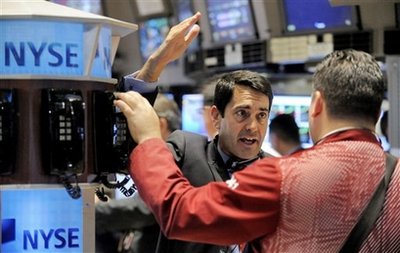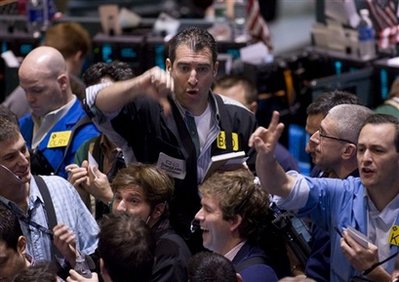NEW YORK -- If ever a 300-point loss on Wall Street could be a good thing, it was Friday.
 A pair of traders get together on the floor of the New York Stock Exchange, October 24, 2008. Wall Street capped another difficult week with steep losses Friday, sending the major indexes to their lowest levels in more than five years. [Agencies] |
Wall Street started the day with a nervous eye on how far stocks would have to fall before triggering emergency trading halts. They ended the session relieved, even though the Dow Jones industrial average closed down 312, or 3.6 percent, its lowest finish since the financial crisis began six weeks ago.
Stock markets in Europe and Asia had plummeted, and oil prices plunged past their lows for the last year on growing fears of a global recession. Major indexes declined more than 14 percent in Russia, and were ordered closed until Tuesday.
Dow futures, a bet, before trading opens, on where stocks would go, had plunged 550 points Friday morning, triggering a temporary trading halt.
"This is beyond volatile. It is chaotic," Carl Weinberg, chief economist at High Frequency Economics wrote in a morning note to clients. "This is the kind of day when the central banks step into the market with an 'unexpected' interest rate move to calm things down."
Instead, it was just another day's loss, one in a series since mid-September that have erased nearly $7 trillion in value from stocks.
Before US markets opened, CNBC flashed a rundown on the level of losses that would trigger trading circuit-breakers, which close the market after steep losses. The first circuit-breaker, a 90-minute halt, would kick in if the Dow lost 1,100 points before 2 p.m.
The Dow fell more than 500 points in the morning, but steadied itself, even though the only good news was the 5.5 percent increase in September existing home sales. That was tempered by median home prices, which dropped to $191,600, down 9 percent from a year ago.
The Dow closed at 8,378, its lowest finish since 8,306 on April 25, 2003. In the last six weeks, the Dow has experienced triple-digit moves in 27 of 30 trading sessions.
Broader indexes also fell more than 3 percent.
The paper loss for the week on the broadest stock index, the Dow Jones Wilshire 5,000, was $800 billion. A sell-off Wednesday, coupled with the losses Tuesday and Friday, gave the index its eighth-worst week since 1979. The index closed at its lowest level since May 2003.
Total losses in the Dow Jones Wilshire 5,000 since the market's October 9, 2007, high are $8.8 trillion, or 44 percent.
Stock investors avoided panic even as oil fell sharply, closing near $64 a barrel, despite a decision by the OPEC cartel to cut production quotas by 1.5 million barrels a day. OPEC officials, meeting in Vienna, left no doubt that they were ready to slice production again quickly if Friday's decision does not end the price freefall.
 Traders work in the crude oil options pit at the New York Mercantile Exchange on Friday, Oct. 24, 2008 in New York. Oil prices fell sharply to around $63 a barrel Friday amid weakening global demand for crude, despite a decision by the OPEC cartel to cut production quotas by 1.5 million barrels a day starting next month. [Agencies] |
"Oil prices have witnessed a dramatic collapse, unprecedented in speed and magnitude," the 13-nation cartel said in a statement.
The dollar plunged below 93 yen, a 13-year low. The British pound fell 8 cents against the dollar, its largest intraday drop since 1971.
Stocks shuddered around the world. Japan's Nikkei stock average dropped 9.6 percent. Hong Kong's benchmark index fell 8.3 percent. As the US market prepared to open, both Germany and France's key indexes were down 10 percent, although both narrowed their losses, with Germany's benchmark DAX index closing 5 percent lower, while France's CAC40 dropped 3.5 percent.
Markets in India, Thailand, Indonesia and the Philippines also fell as investors pulled money out of developing countries on fears they would not only be hit hard by the financial crisis but may also default on debt.
Selling had spread on sobering economic data and weak earnings.
The UK's third quarter gross domestic product fell 0.5 percent, the first decline in 16 years, putting the country on the brink of recession. Shares of Japan's Sony sank more than 14 percent when it slashed its earnings forecast for the fiscal year.
In Germany, Daimler stock dropped 11.4 percent in morning trading; it reported lower third-quarter earnings and abandoned its 2008 profit and revenue guidance.
"Periods of panic punctuated by occasional calm appears to be the manner of things for now," said Daragh Maher, a strategist at Calyon Corporate and Investment Bank in London.
The Federal Reserve Open Market Committee, which sets the Fed's target short-term interest rates, meets Tuesday and Wednesday. Most investors are expecting further rate cuts beyond the current 1.5 percent, which is already near historic lows.








No comments:
Post a Comment